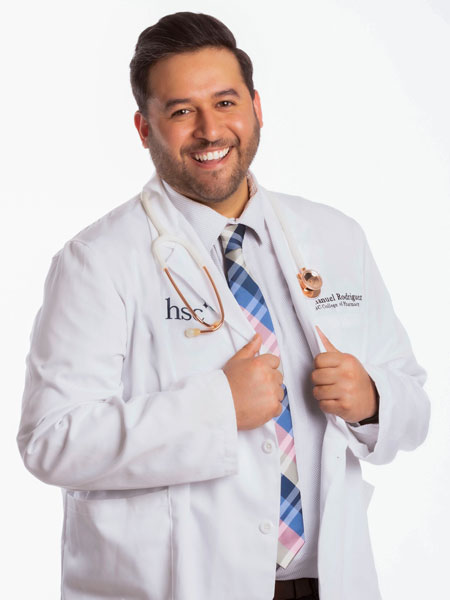Empowering patients to take control of their health is ‘why I want to be a pharmacist’

Emmanuel Rodriguez was two years into his health care marketing career when the pandemic hit along with the economic downturn.
As the world came to a halt, so did his career. At the time, Rodriguez was leading regional marketing initiatives for hospitals and free-standing emergency rooms.
“I had to pivot,” Rodriguez said. “I asked myself – do I want to stay in a saturated market or go after what I originally intended to do?” He was faced with a major decision and had to reevaluate his career goals.
Rewind to high school in Odessa, Texas.
Rodriguez always had an interest in science but “no one in my family worked in health care, so it was hard for me to know where to start,” he said. “Coming from a rural area with fewer resources, I felt like I was at a disadvantage as I didn’t have a defined path to achieve my career goals. I was late to the game.”
While still unclear about his future career ambitions, Rodriguez, a first-generation college student, went on to earn an undergraduate degree in chemistry and biology, as well as an MBA from the University of North Texas.
After graduation, he was offered his marketing position that focused on the business side of health care, but he always felt drawn to the hands-on aspect of patient care.
“When working with the free-standing ERs, I interacted a lot with pharmacists and physicians,” he said. “At one point, I took a step back and thought, ‘I think this is what I really want to do.’” However, leaving a successful career to go back to school wasn’t a viable option at the time.
It took getting laid off due to the pandemic for Rodriguez to reevaluate where he was in life and where he wanted to go with his career. It was that pivotal moment when he realized he was meant to be a pharmacist.
“What really drives me is the concept of helping a patient take control of their health,” he said.
Another driver for Rodriguez is advising patients that “they are in charge and only they can improve their health.”
However, starting pharmacy school in the middle of a pandemic presented some unexpected challenges.
At HSC, all in-classroom learning was switched to online learning via Zoom. For his first year, students only visited campus in small groups during labs to maintain a safe environment.
“It was really difficult,” he said. “I was looking forward to an interactive, hands-on experience and had to adjust to a remote learning environment. I’m very grateful for our Pharmacy faculty and staff who made extraordinary efforts to keep everyone engaged, focused on our studies, while not feeling isolated.”
Being able to start his second year on campus this fall has been a much more rewarding experience and given him a whole new appreciation for the camaraderie of being around his classmates. He is incredibly involved and passionate about his future as a pharmacist.
Rodriguez, a UNT Legacy scholarship recipient, holds leadership positions in numerous student organizations, including the Executive Board of the Pharmacy Student Government Association and Secretary of the National Hispanic Pharmacists Association.
“I love school and am fully embracing being a student again,” Rodriguez said. “I want to have that in-person interaction and seeing what makes people click. I learn from the experiences of other students. It’s a melting pot of ideas, and it’s honestly what makes everything better.”
You can contribute to the success of students like Emmanuel by donating to our student scholarships today.
Donate to the Scholarships Fund
Graduate School is an investment. Parents save dollars to help loved ones fulfill professional ambitions such as becoming the family’s first doctor or pharmacist. Students juggle jobs and graduate studies to pay tuition bills.
Scholarships help ease the financial burden and bring peace of mind to students. Growing HSC’s scholarship pool would allow us to help more students.



![Uyen Sa Nguyen Scaled[58]](https://www.unthsc.edu/newsroom/wp-content/uploads/sites/16/Uyen-Sa-Nguyen-scaled58-145x175.jpg)

Social media